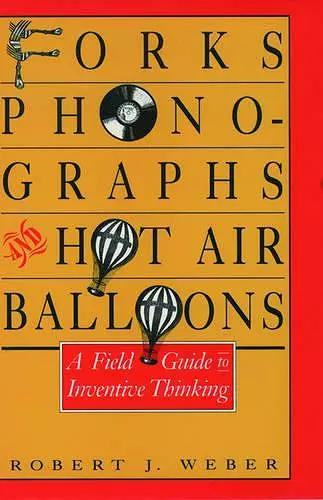Forks, Phonographs, and Hot Air Balloons
A Field Guide to Inventive Thinking
Format:Hardback
Publisher:Oxford University Press Inc
Published:29th Apr '93
Currently unavailable, and unfortunately no date known when it will be back

This book explores the principles behind inventions, revealing how creativity has evolved from the Stone Age to today. Forks, Phonographs, and Hot Air Balloons inspires fresh thinking.
In Forks, Phonographs, and Hot Air Balloons, cognitive psychologist Robert Weber explores the fascinating evolution of human ingenuity through a myriad of everyday inventions. By examining a wide array of examples, he argues that the underlying principles behind these creations are consistent across history, rather than being the result of random inspiration. This perspective invites readers to reconsider how they view the innovations that shape their daily lives.
Weber takes us on a journey from the Stone Age to modern times, highlighting seemingly simple objects like wheels, doorknobs, and sewing needles. These items, often taken for granted, serve as a backdrop for a deeper exploration of the creative processes that led to their invention. The book prompts us to ponder the origins of more complex inventions, such as the tea bag, waterscrew, synthesizers, and even genetic engineering, revealing the interconnectedness of human creativity.
Ultimately, Forks, Phonographs, and Hot Air Balloons encourages readers to tap into their own creative potential. By understanding the cognitive principles that underpin invention, Weber inspires us to look at the world with fresh eyes and recognize our capacity for problem-solving. This thought-provoking work not only illuminates the past but also serves as a guide for future innovation.
'It is difficult to evaluate how well Weber's ideas would work as predictors of future developments, but as explanations of past events, his arguments have a sense of logic and insight. Even if his hindsight is better than his foresight, this is an interesting and entertaining work.' Hilary D. Barton, Lawrence Livermore National Lab, Library Journal
'grippingly written book ... Weber ... offers example inventions to make his arguments; this analysis is at times compelling and, because of its specificity, is likely amenable to future mental testing' Psychological Science, Vol. 5, No. 3, May 1994
'The book is enjoyable to read and the examples and methods of analysis used illustrate the points clearly and well.' Steve Allman, Physics Education
The major advantage of this book is its use of language. Weber examines discoveries from the layman's point of view, which makes for easy reading. The discussion is also relatively free of technical jargon and complicated discussions of how devices work. In short, Weber's text is both accessible to technophobes and excellent for anyone interested in creative and critical thinking.
The section on understanding the created world is fascinating. Using simple methods of analysis, Weber strips everyday objects to the bone, laying bare for all to see why some inventions are shaped, used or made the way they are .. . The book is enjoyable to read and the examples and methods of analysis used illustrate the points clearly and well ... A clear conclusion, and brilliant chapters on heristics and understanding the created world, make the book an enjoyable ... read. * Physics Education *
ISBN: 9780195064025
Dimensions: 241mm x 162mm x 28mm
Weight: 608g
296 pages